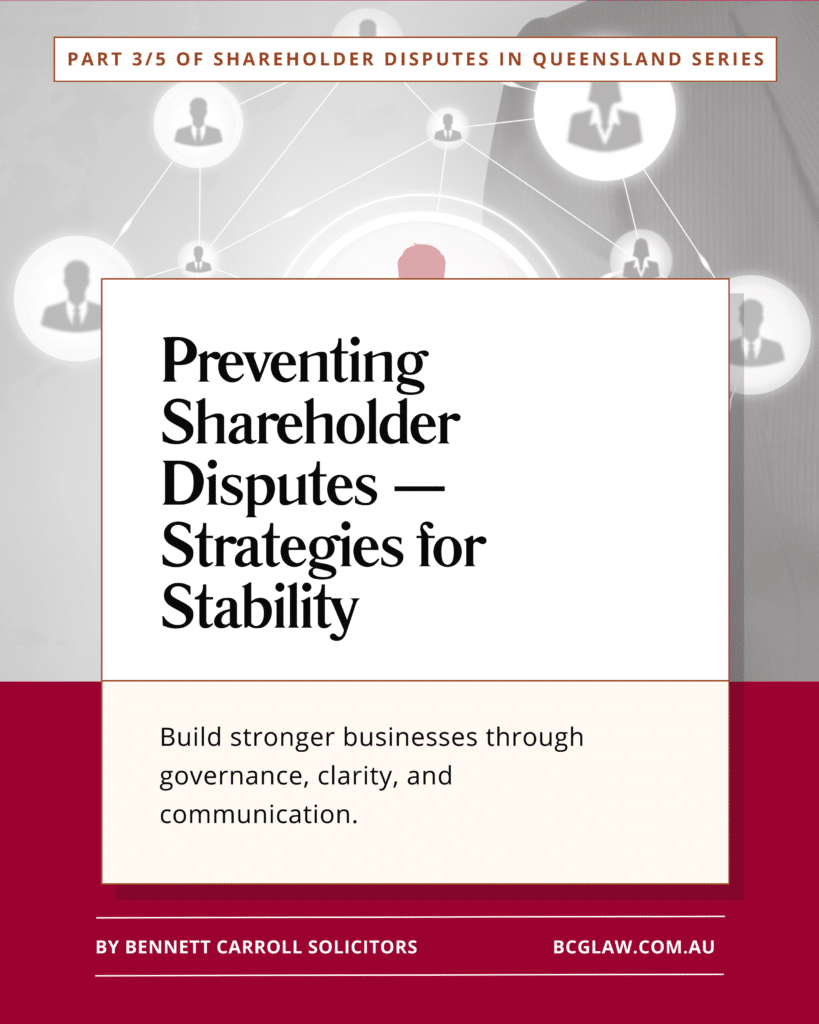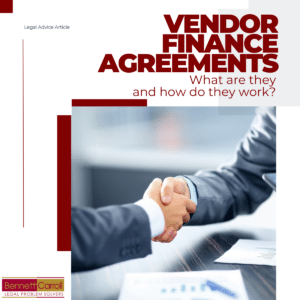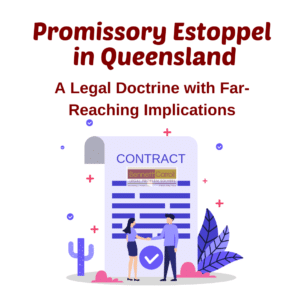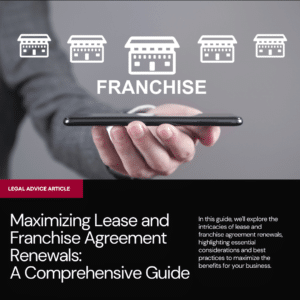Welcome to Part 3 of our 5-Part Legal Guide on Shareholder Disputes in Queensland.
In this series, we will explore the key aspects of shareholder disputes, with a focus on private companies in Queensland. Whether you’re a business owner, shareholder, or legal professional, understanding the common causes, legal frameworks, and resolution strategies for these disputes is essential for the stability and success of your business.
Explore the full series on Shareholder Disputes in Queensland:
Part 1: Causes, Impacts & Early Warnings
Part 2: Legal Frameworks & Shareholder Rights
Part 3: Prevention Strategies
Part 4: Dispute Resolution & Stakeholder Strategies
Part 5: Practical Tips & Recent Developments
Preventative Strategies: Avoiding Shareholder Disputes
Preventing disputes is invariably more cost-effective than resolving them after they arise. Several strategies can help minimise the risk of shareholder conflicts.
Comprehensive Shareholder Agreements
A well-drafted shareholder agreement serves as one of the most effective tools for preventing and managing disputes. These agreements should address:
- Decision-making processes and authorities
- Dividend policies and profit distribution
- Share valuation methodologies
- Buy-sell provisions for when shareholders wish to exit
- Dispute resolution procedures
- Deadlock-breaking mechanisms
- Non-compete and confidentiality provisions
Shareholder agreements can serve as valuable tools for preventing and resolving disputes. These agreements outline procedures for dispute resolution, such as arbitration or mediation clauses, and mechanisms for addressing issues including share transfers, management changes, or deadlock situations.
Effective Corporate Governance
Establishing clear corporate governance practices helps prevent misunderstandings and conflicts. This includes:
- Regular, well-documented board and shareholder meetings
- Transparent financial reporting and information sharing
- Clear separation of management and board responsibilities
- Written policies for key operational areas
- Regular review of company performance against established metrics
Open Communication and Expectations Management
Many disputes stem from misaligned expectations or poor communication. Maintaining open lines of communication between shareholders, setting clear expectations, and addressing concerns promptly can help prevent minor disagreements from escalating into formal disputes.
Identifying Early Warning Signs of Shareholder Disputes
Recognising potential disputes in their early stages provides the best opportunity for resolution before positions become entrenched and relationships deteriorate beyond repair.
Common Warning Signs
Several indicators may signal brewing shareholder tensions:
- Increasing disagreement in board or shareholder meetings
- Breakdown in communication between shareholders
- Exclusion of certain shareholders from information or decision-making
- Unusual financial transactions or unexplained financial performance
- Divergent views on company strategy or major decisions
- Formation of shareholder factions or coalitions
- Changes in behaviour or engagement levels of key shareholders
Initial Response Strategies
When warning signs appear, prompt and considered response can help prevent escalation:
- Address concerns directly through open discussion
- Document all communications and concerns in writing
- Review relevant legal documents, including the company constitution and shareholder agreements
- Consider involving a neutral third party for facilitation
- Consult legal advisors regarding rights and options
- Propose a structured approach to information sharing and decision-making
Next > Part 4: The Legal Landscape — Rights, Frameworks & Obligations | Shareholder Disputes in Queensland Series
Concerned about potential disputes? Contact Bennett Carroll Solicitors for expert legal advice on shareholder conflicts in Queensland. Our expert Commercial Lawyers are here to assist you. With offices across Brisbane, Gold Coast, Sunshine Coast, and Ipswich, we’re ready to help. Contact Bennett Carroll Solicitors today.
External resources:









